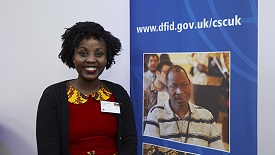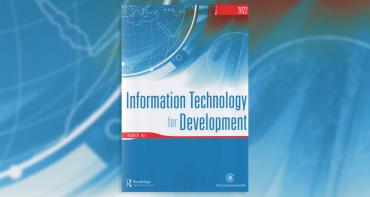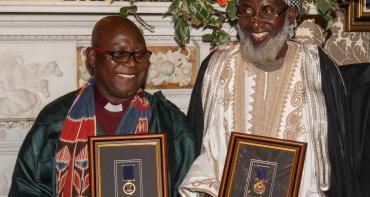More than 900 students have begun their studies in the UK, thanks to the Commonwealth Scholarship Commission (CSC).

More than 900 students have begun their studies in the UK, thanks to the Commonwealth Scholarship Commission (CSC). The Commonwealth Scholars will now study for their PhDs and master’s. Every year the CSC awards scholarships and fellowships for postgraduate study and professional development to Commonwealth citizens.
The keynote speech at Friday’s welcome event was given by Professor Simon McGrath, professor of International Education and Development at the University of Nottingham. Professor McGrath spoke about ‘Higher education and the Sustainable Development Goals: opportunities and challenges for the Commonwealth’. Scholars also heard from the chair of the CSC, Richard Middleton, about the objectives of the Scholarship scheme and from Commonwealth alumni and continuing scholars.
Here, two of this year’s intake of students tell us what receiving the Commonwealth Scholarship means to them, and how they plan to use their studies upon their return.
Lin Cherubai Sambili, PhD in Countering Radicalisation through Sport, Loughborough University (Kenya)

What will the focus of your PhD be?
My PhD will be on countering radicalisation through sports, and will ask how violent extremism comes to be, how we tackle it and how different extremist groups are actually targeting young people. Specifically, it will look at three regions in Kenya: northern Kenya, the South Coast province and Nairobi, because urban youth are also facing a lot of these challenges.
How did you come to be studying this subject?
Back home I ran a sports for development organisation called Sports with a Goal Africa (SWAGA), which uses sport to reach, connect and empower young people, individuals and communities through sport. While we were doing a very interesting cross-border project in Marsabit county, working with the youth there, we realised that they are at risk of being radicalised, and that it is important that we use this highly impactful but low cost tool to actually try and prevent them from being radicalised. I then did my Masters at the International University of Monaco, focusing on ‘Sustainable Peace Through Sports’, back in 2011-2013. Once I was done with the programme, I went back home and started implementing local community, grassroots projects. And so my interest in sports has grown. Loughborough, of course, is also the best sports university in the UK, so it was the best place to continue my studies in this area.
What does it mean to you to be a Commonwealth Scholar?
It means that the world is my oyster. It’s a heavy but beautiful responsibility. It means that I get to inspire many of the young people back in Kenya and also in Africa and globally, and to show that it’s possible, through education, to achieve all of your dreams. Furthermore, as a Commonwealth Scholar, it not only gives me access to countless networks and other young people from all around the world doing amazing work, but also access to great professionals. For instance, the supervisors that I’m working with are the best in the field and that’s access that I could only have got through the Commonwealth, so I’m really happy to be part of the programme.
Mohammad Bashir Mia Khadem, Human Resource Management (International Development) MSc, Manchester University (Bangladesh)

What were you doing in Bangladesh before you were awarded the Commonwealth Scholarship?
I was a teacher and lecturer at one of the best universities in Bangladesh, the University of Dhaka. I teach in the Department of Public Administration.
What difference has the Commonwealth Scholarship made to you?
It’s had a great impact on me. I felt that if I wanted to be a good teacher, I had to be efficient in delivering my lectures and in communicating with the students. The Commonwealth Scholarship is giving me a great chance to study in an international environment, at one of the best institutions, Manchester, with access to world class research and facilities. It’s a type of environment that I cannot get in my country, so I’m indebted to the Commonwealth Scholarship Commission for giving me this chance.
What do you plan to do when you go back to Bangladesh?
After completing my degree, I’ll return to my country and continue to teach. I think what I learn here, via the Commonwealth Scholarship, will have a multiplier effect on my students and will generate knowledge over the years too. I will share my knowledge and experience and research ideas that I have gained at Manchester University with my students back home, with my fellow colleagues, and with my countrymen, and in future this will help the country to develop.



